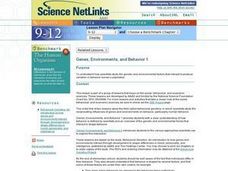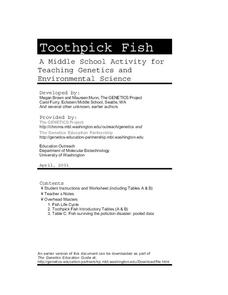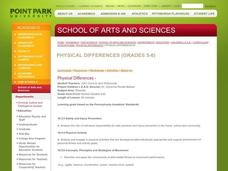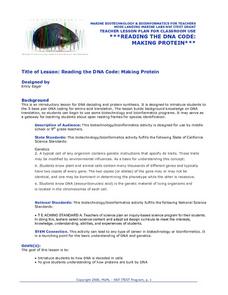Curated OER
Gene Puzzles
Young scholars come to understand that in sexually reproducing organisms, such as humans, typically half of the genes come from each parent.
Students examine a fictional pedigree and determine which gene is responsible for a given trait....
Curated OER
Genes, Environments, and Behavior 1
Students examine how scientists study the genetic and environmental factors that interact to produce variation in behavior across a population.
Curated OER
What Do Genes Look Like?
Seventh graders describe the basic structure of the DNA molecule. They identify what an inherited trait is and how it can be determined by one or more genes. Finally, 7th graders identify that plant and animal cells contain several...
Curated OER
Genes, Environments, and Behavior 2
High schoolers explore how scientists study the genetic and environmental factors that interact to produce variation in behavior across a population.
Curated OER
Making Babies
Sixth graders complete a human traits survey. In this genetics activity students read articles and fill out a worksheet on genotype and phenotypes.
Curated OER
Cell Structure and DNA
Sixth graders identify, locate and describe the function of the parts of a cell. In groups, they state the five stages of mitosis and put them in the correct order. They are introduced to the structure of DNA and mRNA and how they...
Curated OER
Genes
Young scholars explore the history, inheritance and mutations of genetics. In this genetic lesson students complete experiments on DNA sequences.
Curated OER
Cotton and Cabbage
High schoolers note how given traits could be achieved by selective breeding and by transgenesis. They identify different uses of GEO. Students recognize that the use of letters (Bt) before an organism's name means that the organism has...
Curated OER
Memory Book - A Cooperative Learning Experience
Students document sections of their life through pictures, stories, and video to create an English "memory book". They use photographs, video and edited video which includes their history, includes calculated growth, and genetic...
University of Washington
Toothpick Fish
With colored toothpicks representing genes, youngsters practice passing them through generations of fish and learn about heredity. Consider this as an introductory activity since it does not represent recessive genes with lowercase...
Curated OER
Diversity
Students access prior knowledge of the five senses and relate to students with disabilities. In this people with disabilities instructional activity, students research and use a Venn diagram to compare and contrast famous people and...
Curated OER
In the Future we will all be Mixed Bloods and Mestizoes
Students examine the concept of origin and ethnicity. In this ethnic studies instructional activity, students engage in a variety of interdisciplinary activities including posters, and discussions to better understand our past and future.
Curated OER
Reading the Dna Code: Making Protein
Students study DNA decoding and protein synthesis. They use the amino acid table to translate DNA, break DNA strands into three nucleotide codes, and translate nucleotides into amino acid protein codes. They research the importance of...
Curated OER
Spring
Young scholars examine lichens in an outside field trip. Students explore the diversity of this organism and ask questions about them.
Curated OER
Human Origins: The Prehistoric Human Race
When it comes to the origin of the human species high schoolers are full of misconceptions. Clear up the hominid confusion with this evolutionary activity focused on assisting students in understanding prehistoric man and his family...
Curated OER
Where Are the Dinosaurs?
Young scholars explore the concept of extinction by studying dinosaurs. In this dinosaur instructional activity, students distinguish between extinct creatures and those that still exist.
Curated OER
What can I do?
Pupils identify feelings and explore positive ways to handle conflict. In this mental health lesson students discuss feelings and how to constructively handle them.
Curated OER
Asexual versus Sexual Reproduction
Students explore reproduction. They research organisms and groups of organisms to determine whether they reproduce sexually or asexually. In addition, they determine the organism's habitat.
Curated OER
A Mendel Seminar
Students analyze Gregor Mendel's discovery of a process of biological evolution. They also explore how recessive and dominant traits are passed from one generation of living organisms to the next. This lesson involves environment...
Curated OER
Where are the Dinosaurs?
Learners construct their own diorama based on the life of a dinosaur. In this dinosaur lesson, students create models of dinosaurs and dinosaurs' eggs to explore the life cycle of this extinct species.
Curated OER
And the Verdict Is...
Young scholars identify the unique pattern DNA forms in each individual, and how that pattern can be used to identify criminals. They have the opportunity to simulate the process of matching DNA samples to those taken at a crime scene.
Curated OER
Producing a Strain of E. coli that Glows in the Dark
Students observe the experimental process called bacterial transformation and demonstrate phenotype changes in bacteria that have been transformed with an antibiotic-resistance gene and a metabolic marker. They create a luminescent...

























